The Covid pandemic impacted different Transition groups in a variety of ways. Some found projects they had been working on previously, like food gleaning, overnight became far more important and recognised than they had been. For others though, with physical meetings impossible, that serendipity of connections that can only happen when you get people into a real room, was no longer possible in a Zoom, and energy dissipated.
Commitments on people’s time changed too and many people with a helpful volunteering mindset got absorbed into meeting other highly urgent needs in their community. This was certainly the case in Chipping Norton, a market town in the Cotswolds with a population of about 6,000.
Transition Chipping Norton (TCN) had, in effect, dwindled to being carried by just one person holding it all together, propped up by one or two others. Events lapsed and volunteers quickly found their time was committed elsewhere. As life gathered pace it was clear that just picking up where things had left off was not going to generate the interest and energy needed to make a substantial difference to tackling climate change locally.
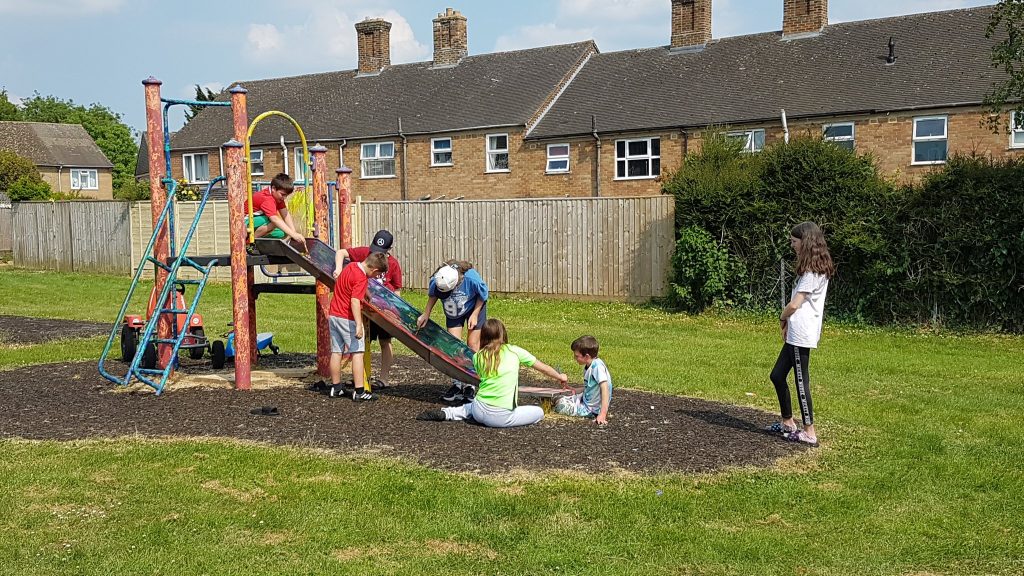
Before: Transition Chipping Norton realised that facilities and provision for young people in Chipping Norton were limited, with run down play parks and lack of space to connect and get support. Photo: Learn2Sustain/Transition Chipping Norton
Priorities had changed in the community too: the town was set to double in size, and the imposed isolation and restrictions of Covid had impacted everyone. In particular, the town’s young people were suffering from a sense of disconnection and disenfranchisement. Mental health support services were being overwhelmed and it was clear that young people were really struggling.
Cara Hedges from the group had been volunteering at a youth club in the town and noticed how withdrawn young people were, spending much of the sessions they attended glued to their phones, reluctant to engage with people. When asked what they wanted in their town, the young people said a skate park and a BMX track and opportunities to meet and hang out. She put her head together with TCN stalwart Marcus Simmons and together they came up with a plan to support the town’s young people and connect them with the wider community. They felt it was essential for everyone that young people felt they could make their voices heard and make a difference in their town.
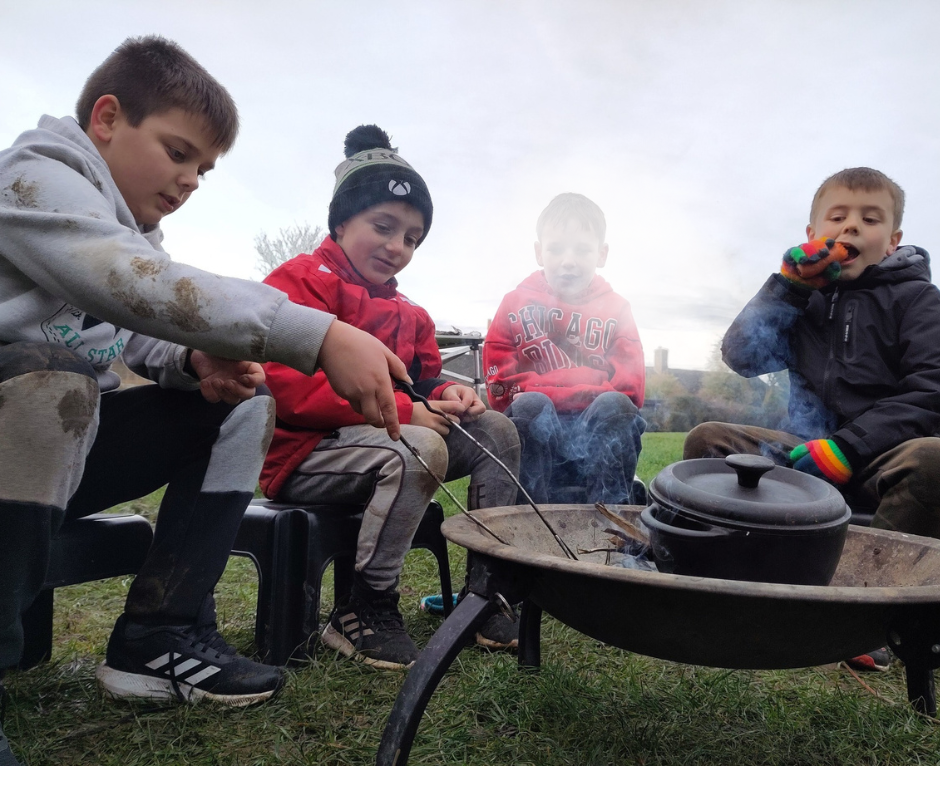
The outdoor activities included cooking food, art and games, as well as exploring what the young participants wanted to see change in the town. Picture: Learn2Sustain/Transition Chipping Norton
They realised it was important to start where young people wanted to be, so set up open access youth sessions at a local park which youngsters had complained was really run down. For the first meeting they created a mini bicycle obstacle course, engaged a bushcraft leader and created opportunities for brainstorming what they would like in their town, along with some football. This proved popular amongst the teenagers and so every 3 weeks a different activity was organised in the park, which included a theme linked to sustainability and Transition.
They organised a fire pit to become a focal point for cooking and discussions and invited local Councillors to come and meet with the young people and hear their views. Each session they would do some camp cooking together using produce from the community orchard or local allotments to help widen their experiences – making carrot cookies or apple upside down cake in a frying pan, nettle pasta, or rhubarb crumble and ice cream both made in Dutch ovens.
By forming a vital bridge of communication between this community and the Town Council, new play equipment was installed based on the young people’s designs. They supported the town council to put up a a mobile stake park for a coronation celebration weekend, as TCN helped the young people campaign for a permanent one for the town. The young people also started a footpath campaign to create better access to the new housing estate and facilities.
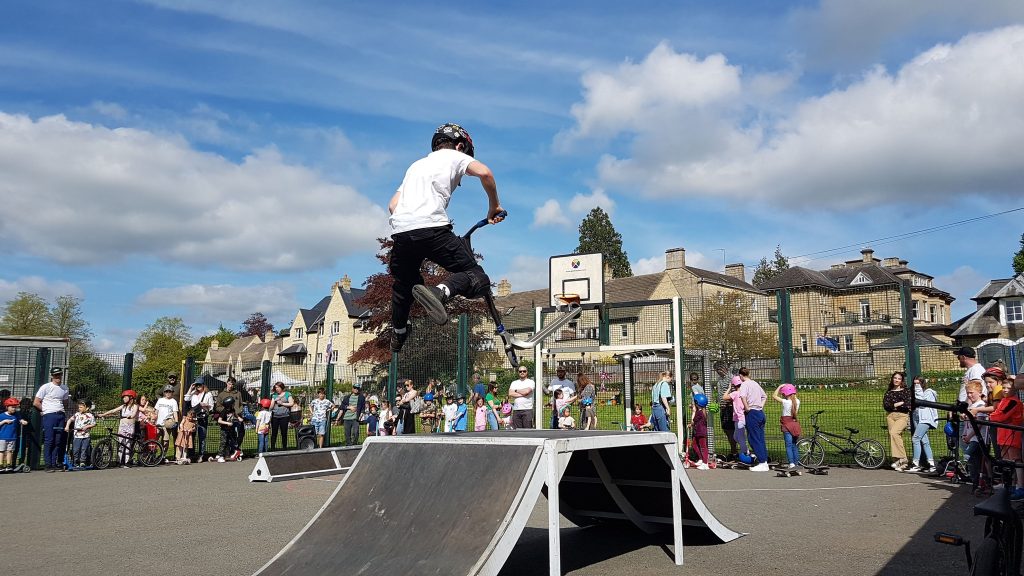
A mobile skate park was organised by the Town Council for a coronation celebration weekend – part of the young people’s campaign for a permanent one in the town. Photo: Learn2Sustain/Transition Chipping Norton.
Cara described the difference in the self-confidence of the youngsters, which has been really heartening, as they learn new skills and engage with a wider audience. She regularly visits the park accompanied by town or district councillors – the Mayor is a regular! The youngsters have the confidence to talk enthusiastically about their thoughts on the local area. This has given the councils a much clearer sense of the priorities of local young people. Now 80 young people are involved in the projects.
Along with the new youth project Marcus and Cara recognised that they needed to find a way to regenerate the Transition group’s membership, put on fresh activities and inspire a renewed raft of volunteers and work towards registering as a charity. With almost no budget, limited time and resources this was going to be a challenge!
They also knew they would need more stable funding coming in so they could continue this project long term – youth projects require a considerable amount of infrastructure, and so much of the funding available requires organisations to be registered as a charity.
It was around this time that TCN applied for and got a grant as part of Transition Together’s Seed Funding programme, funded by the National Lottery Community Fund. It enabled them to pay for the admin work needed to support the work they were doing, and to get everything they needed in place to achieve charitable status. This not only puts them in a stronger position for finding grant funding but enables them to act as an umbrella organisation supporting other projects and initiatives that fit with the TCN ethos. Alongside this they got a small grant to support the work with young people – vital funds which kept it going until further funding was secured.
To create opportunities for people to get involved, Marcus and Cara conceived the idea for a group that they jokingly referred to as Friday Fireside Filosophy which was to meet fortnightly. This was to enable adults who felt isolated by the pandemic to reconnect in a neutral outdoor space and chill out around a fire. It would provide a safe space for people to talk about issues that were important to them, joining together landowners, parish councillors and those passionate about the environment. Meeting at a local allotment meant that adults from all backgrounds could feel welcome in a bid to break down barriers to joining in and to offer the sessions for free. The group would be supported by a Whatsapp chat forum to enable people to continue conversations and feel connected between meet ups.
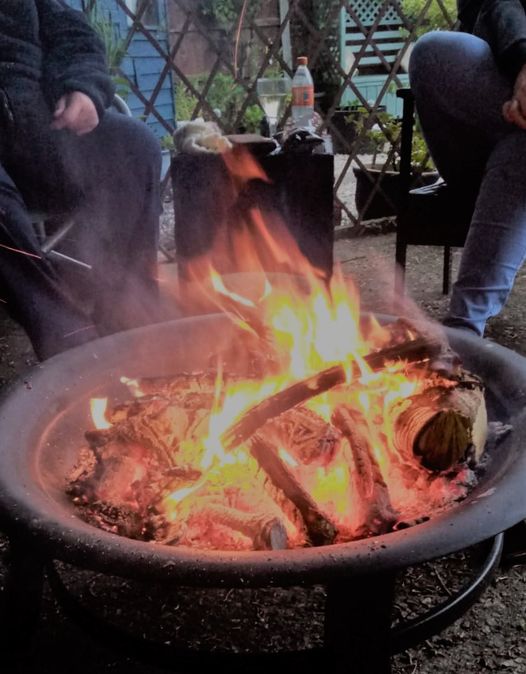
Fireside chats: the group created space for people to connect and share ideas and needs in the town.
People were invited to bring warm clothes and something to drink. The events were promoted on Nextdoor and became very popular. The Mayor and other Councillors came, and people loved the safe space and the conversations that took place. Sadly though, after a while, it became impossible to hold the meetings at the allotments due to concerns about potential break-ins into sheds and a new venue had to be found. members rallied to keep the meetings going, and they have evolved to gathering in gardens or front rooms depending on the weather.
They also planned to regenerate a foraging group, where people of all ages and backgrounds could see their local environment through different eyes, learning about features of their local area and sharing knowledge on plants and recipes. This would spark more connections and give rise to new projects that locals might want to take on.
These also provided a starting point for people to get involved and could link into other community events such as the Women’s Cycle Tour, Apple Day at the Community Orchard and help integrate different members of the community.
With this new burst of energy, projects started up. The foraging group began hosting events in different places around the town, sharing ideas, recipes, and plant identification. Again, meetings were advertised on Nextdoor and became almost too popular, with 30 new families engaged! Connections were made with people finding out about other projects, such as tackling local river pollution, woodland management, and permaculture.
When I asked Cara what the Transition Together funding made possible for the group, she said “it gave us the security to be able to focus on long term goals of forming a charity and creating robust and diverse projects, as well as space to be able to perform all the administration that was needed to get things in place. We now have a Board of Trustees, a larger team of volunteers, a busy calendar of community events and are in a far stronger position to apply for further funding”.
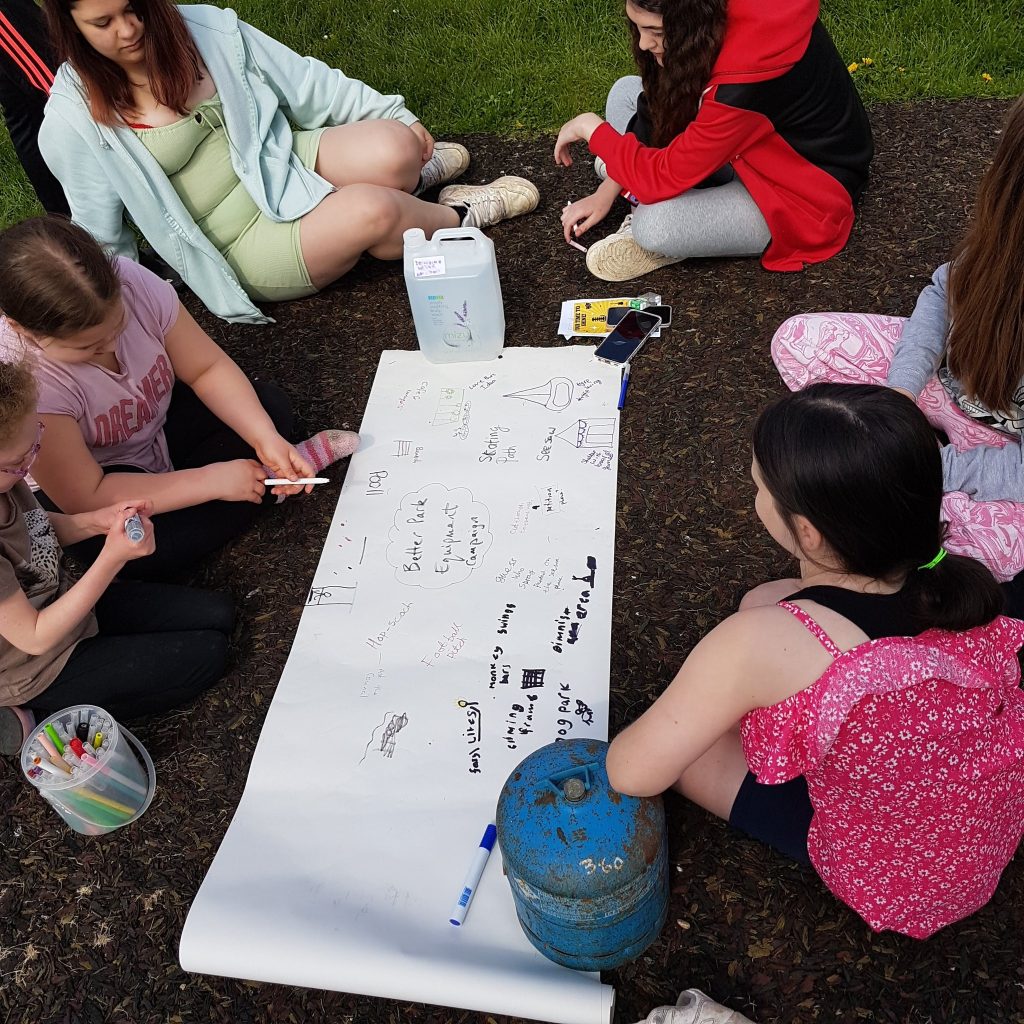
Young people plan what play equipment they would like to see installed in their local park. Town councillors came to the Transition Chipping Norton youth meet ups to hear their ideas and based the designs on the young people’s input. Photo: Learn2Sustain..
I asked Cara what the group’s shift to a focus on young people had brought to the group. She said: “It helped us to view every aspect of the town from a young person’s perspective. Taking an approach focused on integrating their needs opened up many new doors and generated more interest in what we do. It has gained political support for our work, crucially opening doors for young people to have their voices heard. It has made us more attractive to funders and led to more people donating their time. It has helped break down barriers and ensured that we focus on planning activities that are fun! We were guilty of being a pretty middle-aged and middle-class group, this work has brought forward a far more diverse mix of people which benefits everyone.”
So, what’s next? The work of building connections to the Town Council has led to the Town Hall being opened up once a week for young people to use (within funding from SNG, #iWill and Chipping Norton Town Council. TCN are keen to develop this in line with what the young people want, and so far at their request, they have hosted games nights, a boardroom take over showing a horror film in the Council Chambers, and themed cooking nights, where one formerly shy teenager imagined herself in the role of Gordon Ramsey to run the kitchen.
With food supplied by the Chippy Larder and end-of-day pastries from local care MOR, they are bringing in conversations around the topic of food waste. By owning the space where Town Council meetings take place, it is hoped that these youngster will continue to grow in confidence and feel able to make their views heard to the Town Council – and beyond…
Transition Chipping Norton held their first official AGM as a charity on the 30th of September and is creating a more formal membership, as well as more projects and continuing to build on what has been developed so far. With more trustees coming on board, and more members volunteering, it is a really exciting time to be involved.
I asked Cara for her advice to any other Transition group who might be considering making an application to Transition Together’s Seed Funding. “What we found was that planning what to apply for really made us crystalise our thinking”, she told me. “The time pulling together your ideas for the application is not time wasted. It helps you to order your thoughts, focus on your priorities, evaluate the importance of where you’re heading and really believe in what you are doing. And if you’re not successful, it’s really useful for other bids too”.
Follow Transition Chipping Norton on Facebook.
To see how the youth project has developed, follow it on Facebook.






